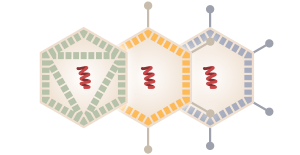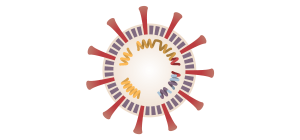According to the World Health Organization, more than 180 vaccines are currently being studied, but, at this point, only a handful of them are in clinical trials. We have recently provided summaries on clinical trial results of BNT162b1 (Pfizer/BioNTech), mRNA-1273 (Moderna) and Sputnik V (Gamaleya Research Institute) COVID-19 vaccine. In this article we shall provide short summaries other putative COVID-19 vaccines currently in the clinical trial phase:

Viral Vector Vaccine (Source: https://www.nytimes.com/interactive/2020/science/coronavirus-vaccine-tracker.html)
ChAdOxnCoV-19 vector vaccine (AstraZeneca and Oxford University): This vaccine uses a recombinant, non-reproducible viral vector [(chimpanzee adenovirus (AdV)] to express the entire S (pike) protein of SARS-CoV-2, including its cleavage site. In a phase I/ II trial, carried out on 1077 people aged 18 to 55 (2 injections at 4 weeks apart), researchers detected vaccine induced humoral and transient cellular responses (between the 2nd and the 7th week) in vaccinees. ChAdOxnCoV-19 vaccinees in the trial experienced more adverse reactions than placebo: with more than 60% and 70% of them experiencing febrility and tiredness, respectively. This vaccine is currently undergoing a phase III trial involving 30,000 participants with the primary end-point being mild to moderate forms (e.g. cough or fever + PCR positive) of COVID-19. So far, two cases of transverse myelitis were reported in the vaccine group, causing the trial to stop temporarily. (Also Read: ChAdOx1 nCoV-19 vaccine is safe and immunogenic)
Ad26.COV2.S (Janssen) and Ad5 (CanSino) vector vaccines: Preliminary results on two other vaccines using adenoviruses (viruses responses for the common cold) have been published: Ad26 /protein S without cleavage site (Janssen), and Ad5 / Protein S (CanSino, phase II randomized trial) illustrated low levels of neutralizing antibodies , which could be potentially linked to existing cross-reactive immunity that target the Ad5 vector (a relatively common virus). A phase III study has just been launched with the Janssen vaccine, which aims to demonstrate an efficacy of at least 60%. A phase III trial is also underway with the Ad5 CanSino vaccine. (Also Read: Safety and immunogenicity of the Ad26.COV2.S COVID-19 vaccine candidate.)

Inactivated Vaccine (Source: https://www.nytimes.com/interactive/2020/science/coronavirus-vaccine-tracker.html)
CoronaVac inactivated vaccine (formerly PiCoVacc, SinoVac): In a phase II randomized trial in 600 patients, CoronaVac (2 injections 2 or 4 weeks apart) resulted in moderate levels of neutralizing antibodies, particularly in younger patients (under 39 years of age) and was associated with an acceptable side effect profile looks. A phase III trial is underway in China, Brazil and Indonesia involving 8,870 healthcare professionals. This vaccine is already in use by the People’s Republic of China army. (Also Read: Development of an inactivated vaccine candidate for SARS-CoV-2).

Protein Based Vaccine (Source: https://www.nytimes.com/interactive/2020/science/coronavirus-vaccine-tracker.html)
Recombinant protein vaccine NVX-CoV2373 (Novavax): This recombinant vaccine consists of an S protein deprived of its cleavage site which is optionally adjuvanted (Matrix M, of the saponin family). Slight modification of the S proteins results in the assembly of viral proteins in rosettes configuration (wrongly called “nanoparticles” by the promoter laboratory). A phase I/II trial, conducted in 131 participants, showed that the non-adjuvanted version had no immunogenicity, with vaccine induced immunity greatly improved by the addition of the adjuvant. The IgG levels after the second injection were particularly high and good CD4 Th1 skewed cellular immune response was also observed. A phase III study has just been launched on 10,000 participants, but its protocol and its efficacy criteria have not yet been published. (Read more: Keech et al., 2020. Phase 1–2 Trial of a SARS-CoV-2 Recombinant Spike Protein Nanoparticle Vaccine. NEJM)
In conclusion, it is difficult to compare the effectiveness of these different vaccines, only days to come will inform us which of these vaccines will be about the most immunogenic with minimal side effects.
Summary by Sanaa Sabour Alaoui










